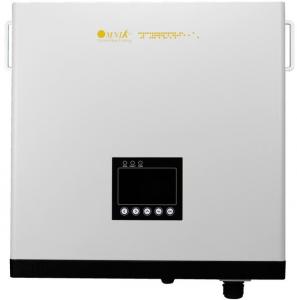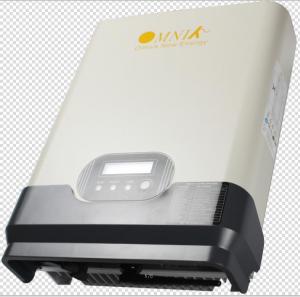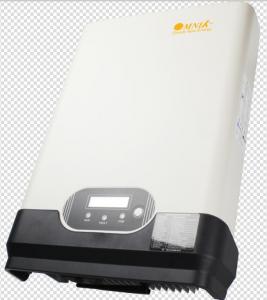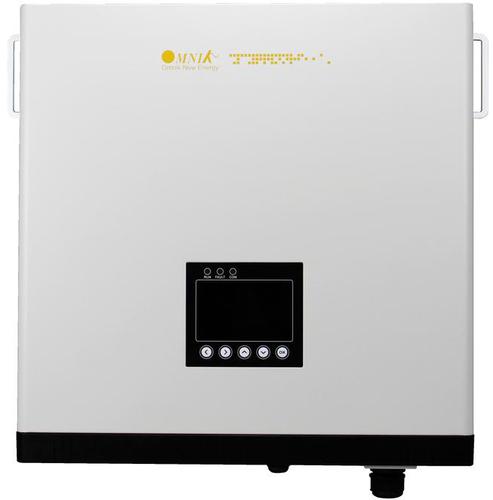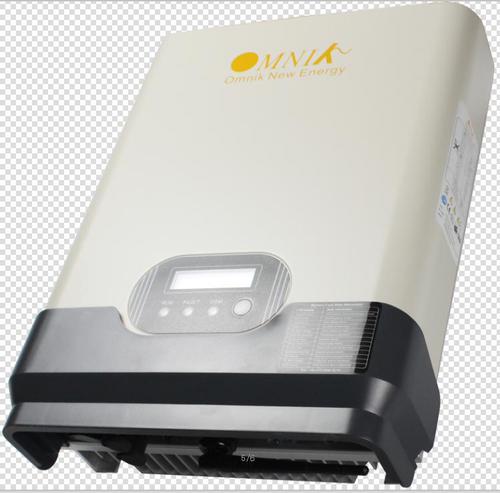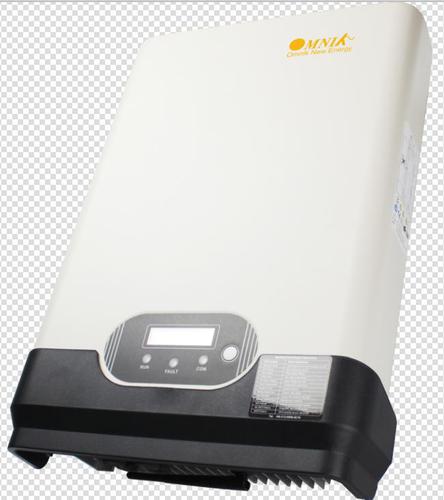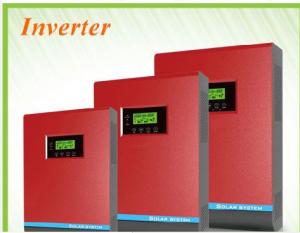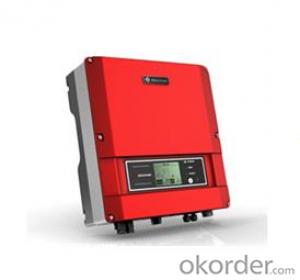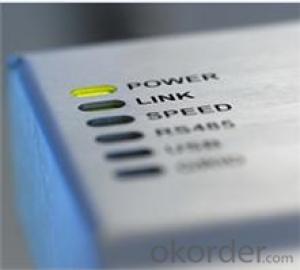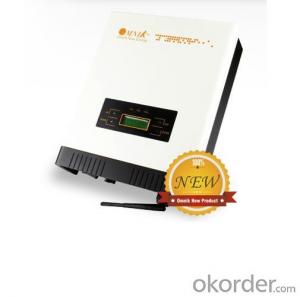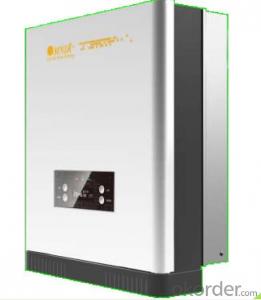Livguard Solar Inverter Omniksol-1.5k-TL
- Loading Port:
- Shanghai
- Payment Terms:
- TT OR LC
- Min Order Qty:
- -
- Supply Capability:
- 3000 pc/month
OKorder Service Pledge
OKorder Financial Service
You Might Also Like
Omnik new energy solar inverter
Omniksol-2.0k-TL Photon Efficiency up to 3kW
in the world------ Photon tested Jan. 2012.
Omniksol-1.5k-TL
Futures
Transformerless design, high efficiency (Max.97.5%,Euro.96.6%)
High MPPT accuracy(>99.9%)
Wide DC input range(120-500 Vdc), compatible with different module technologies
Easy to wire, install and operate
IP 65 design, suitable for indoor and outdoor installation
5 years warranty(10~25 years as option)
technical data:
Type | Omniksol-1.0k-TL | Omniksol-1.5k-TL | Omniksol-2.0k-TL |
Max. PV-Generator Power [W] | 1300 | 1750 | 2300 |
Max. DC voltage [V] | 500 | 500 | 500 |
MPPT DC voltage Range [V] | 80-300 | 120 - 450 | 120 - 450 |
Turn off DC voltage [V] | 80 | 120 | 120 |
Max. DC Current [A] | 16 | 18 | 18 |
Nominal DC Current [A] | 8.5 | 14 | 16 |
Number of DC Connection | 1 | 1 | 1 |
DC-Connection | MC4 | MC4 | MC4 |
Number of MPP trackers Turn on Power [W] | 1 | 1 | 1 |
Turn on power(W) | 10 | 10 | 10 |
- Q: What is the importance of surge protection in a solar inverter?
- Surge protection is crucial in a solar inverter as it safeguards the system against voltage spikes or power surges. These surges can occur due to lightning strikes, grid fluctuations, or other electrical disturbances, and can potentially damage the sensitive electronics in the inverter. Surge protection devices divert excessive voltage away from the solar inverter, preventing costly damage and ensuring the efficient and uninterrupted operation of the solar power system.
- Q: Can a solar inverter be used with solar-powered recreational vehicles (RVs)?
- Yes, a solar inverter can be used with solar-powered recreational vehicles (RVs). A solar inverter converts the DC (direct current) energy generated by solar panels into AC (alternating current) energy that can be used to power various appliances and devices in an RV. This allows RV owners to utilize solar energy for their electrical needs while on the road.
- Q: Can a solar inverter be used without solar panels?
- No, a solar inverter cannot be used without solar panels. The purpose of a solar inverter is to convert the direct current (DC) generated by solar panels into alternating current (AC) that can be used to power electrical devices in a home or building. Without solar panels producing DC electricity, there would be no input for the inverter to convert.
- Q: What is maximum power point tracking (MPPT) in a solar inverter?
- Maximum Power Point Tracking (MPPT) in a solar inverter is a technique used to optimize the energy output of a solar panel system by continuously tracking and adjusting the operating point of the panels to ensure they are operating at their maximum power point. This is achieved by dynamically adjusting the voltage and current levels to match the changing environmental conditions and load requirements, allowing the solar panels to produce the maximum amount of power available at any given time.
- Q: How does a solar inverter handle voltage and frequency variations caused by load shedding?
- A solar inverter handles voltage and frequency variations caused by load shedding by constantly monitoring the grid conditions. When it detects a drop in voltage or frequency, it adjusts its output parameters accordingly to maintain a stable supply of electricity to the connected loads. This ensures that the devices receiving power from the solar inverter are not affected by the fluctuations in the grid caused by load shedding.
- Q: How does a grid-tied solar inverter function?
- A grid-tied solar inverter functions by converting the DC (direct current) electricity generated by solar panels into AC (alternating current) electricity that can be used to power homes or businesses. It synchronizes the AC electricity produced by the solar panels with the utility grid, allowing excess energy to be fed back into the grid for credit or compensation. The inverter also ensures the safety of the grid by continuously monitoring the voltage and frequency of the electricity produced.
- Q: Can a solar inverter be used in systems with different module orientations?
- Yes, a solar inverter can be used in systems with different module orientations. Solar inverters are designed to convert the direct current (DC) generated by solar panels into alternating current (AC) for use in homes or businesses. They are compatible with various module orientations, including those that are east-west or south-facing. The inverter's maximum power point tracking (MPPT) technology allows it to optimize energy production regardless of the module orientation, ensuring efficient utilization of solar energy.
- Q: What is the maximum number of parallel inverters that can be installed in a solar system?
- The maximum number of parallel inverters that can be installed in a solar system depends on various factors such as the size and capacity of the solar system, the availability of space, and the electrical requirements of the installation. There is no fixed maximum number as it can vary significantly depending on these factors.
- Q: How is a solar inverter connected to the solar panels?
- A solar inverter is connected to solar panels through a direct current (DC) input from the panels, which is then converted into alternating current (AC) output by the inverter.
- Q: What is the role of maximum power control in a solar inverter?
- The role of maximum power control in a solar inverter is to optimize the performance and efficiency of the solar PV system. It ensures that the solar panels are operating at their maximum power point, allowing them to generate the highest possible amount of electricity from the available sunlight. This control mechanism adjusts the voltage and current levels to match the load requirements, enabling the inverter to deliver the maximum power output to the grid or connected devices. By actively managing and regulating the power flow, maximum power control helps to maximize the overall energy production and utilization of the solar installation.
Send your message to us
Livguard Solar Inverter Omniksol-1.5k-TL
- Loading Port:
- Shanghai
- Payment Terms:
- TT OR LC
- Min Order Qty:
- -
- Supply Capability:
- 3000 pc/month
OKorder Service Pledge
OKorder Financial Service
Similar products
Hot products
Hot Searches
Related keywords
